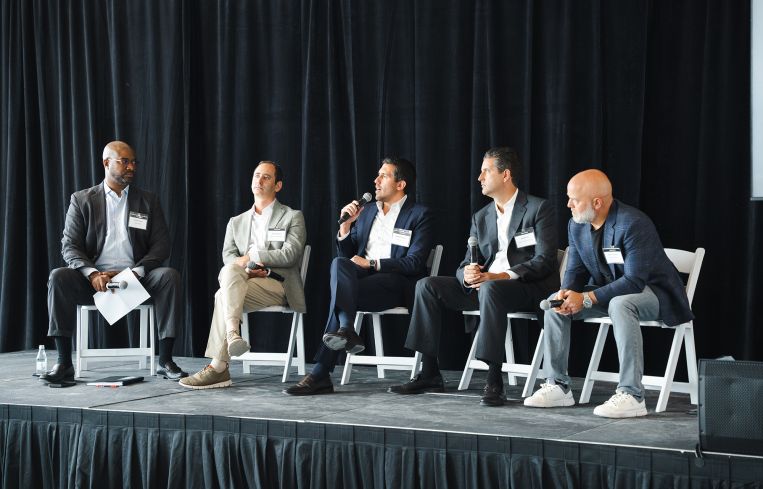Miami Multifamily and Mixed-Use Up Against Changes in 2025: Forum
A recent Commercial Observer confab of developers, brokers and lawyers finds tariffs and interest rates top of mind
By Julia Echikson April 7, 2025 4:05 pm
reprints
Tariff was the word of the day at Commercial Observer’s Miami Multifamily & Mixed-Use Forum held April 3 at the Wynwood Plaza. The day before, President Donald Trump had announced broad tariffs on virtually all foreign countries except Russia and Belarus. During the conference, markets were in freefall and a nervous energy befell the room.
“Don’t look at your portfolio,” one attendee urged.
Horatio W. Jones IV, managing director of multifamily capital at Wells Fargo, the moderator of a panel about financing, got straight to it, asking “How do you feel about all this?”
“The biggest cost is really uncertainty,” answered panelist Aaron Stolear, president of development at 13th Floor Investments. “As an investor or a capital provider, why would you ever develop a project if you just have this big premium of tariffs?”
“We got a call last week from Kohler. [We] came to order a whole building by Wednesday. On Friday, they were increasing prices,” added Andrew Till, chief operating officer and principal at Baron Property Group, referring to the plumbing materials giant.
Still, others cautiously shrugged off the added cost of tariffs. “It’s going to force people to be sharper,” said Daniel Lebensohn, co-CEO and founder of BH3 Management, a developer. “Better projects will be developed by better people.”
One panelist was even optimistic. “In the long term, it will be a benefit,” said Alfonso Costa Jr., chief operating officer of developer Falcone Group. “Mexico and Canada will come to the table.”
There are other silver linings, too. President Trump’s moves could weaken the dollar and entice a new set of foreigners to buy Miami condos, David Martin, CEO of developer Terra, noted in another panel about the South Florida market. The panel was moderated by Zachary Darrow, chairman of law firm DarrowEverett.
Developers and lenders have also adapted to elevated interest rates for longer. “Things slowed down, everyone was trying to figure out the Fed,” Greg Newman, senior managing director at Bank OZK. “Now it’s a lot safer. Participants have accepted the rates.”
“There’s still huge upside in Florida,” said Diego Torrealba, executive vice president at MG Developer.
Even Miami’s horrendous traffic is not so bad, since it’s proof that Florida remains in demand, according to Isaac Toledano, CEO of developer BH Group. “Whenever my kids complain about traffic, I tell them to shut up — it’s good for business.”
But not everyone agrees. The lack of public transit is hindering Miami’s growth, said all the speakers during a panel about live-work-play neighborhoods, which was moderated by Carlos Lagos, a shareholder at law firm Greenberg Traurig.
“If you live in Brickell, you don’t go to the beach,” said Ben Mandell, principal at Tricera Capital. “The traffic is insane.”
“I think the subway system made New York flourish,” said Russell Galbut, co-founder of developer Crescent Heights. “A community that’s smart will embrace RTZ.” The abbreviation stands for “rapid transit zone” and refers to developments designed around public mass transit.
“RTZ is so important. You’re enticing me to build more and bring back to the urban core,” added Lissette Calderon, founder and CEO of Neology Development Group.
Despite some pain points, Florida has come a long way from its Great Recession-ridden, overleveraged market from a decade ago, according to speakers of a residential panel moderated by Philip Rosen, a partner at law firm Shutts & Bowen.
“There’s a healthy presale. That’s really different from the last slowdown,” said Nelson Stabile, principal at Integra Investment.
“And it’s healthy having 50 percent deposits,” added Fernando de Nuñez y Lugones, co-founder and CEO of Vertical Developments.
Consider this: PMG once only had a 5 percent equity stake in a project in Aventura, something that’s unlikely to happen today — for the better, said Ryan Shear, managing partner at PMG.
Regardless of the market, developing the best in class will always remain key to success. This sentiment was shared by the event’s two keynote speakers: Adi Chugh, founder and CEO of Tyko Capital, and David Levinson, chairman and CEO of L&L Holding Company.
“Everything you have to deliver has to be in terms of hospitality and best in class. In a bad market, you will get the tenant,” said Levinson in a fireside chat moderated by Aaron Krawitz, founder and CEO Bravo Property Trust.
“My tagline is top sponsor, best asset class, and best in class,” Chugh added.
Other speakers at the event included Harvey Hernandez, CEO of Newgard Development Group; Camilo Miguel Jr., CEO of Mast Capital, Ryan Doyle, senior director of Southeast originations at Nuveen Green Capital, and Allie Eichner, president of developer Continuum Company.
Julia Echikson can be reached at jechikson@commercialobserver.com.



